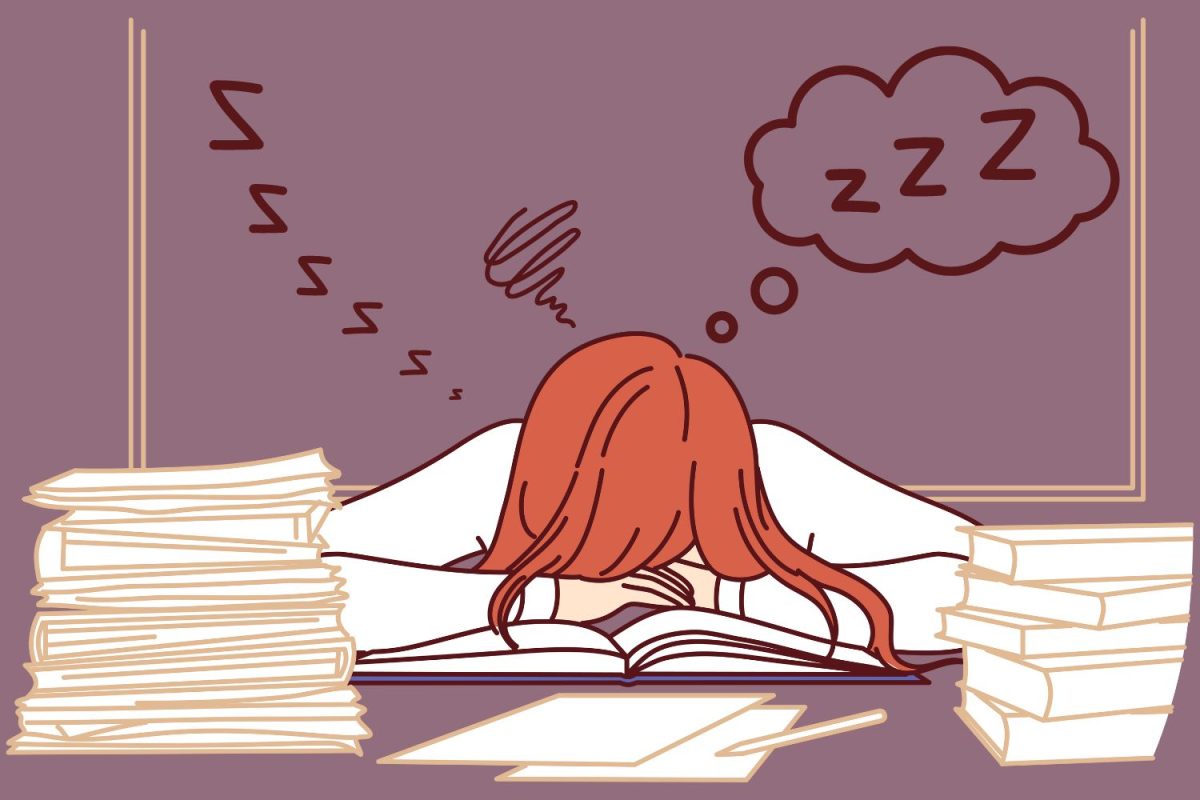*To protect certain students, names have been changed in this article.
“It was a simple homework assignment,” Robbie Shaw* (’17) explained. “We just had to do a long reading and then take notes on it.”
As class started to settle down, Shaw began to move uncomfortably in his seat. He knew he had done neither, and feared the teacher was going to check for proof that the assignments had been completed. He saw the teacher gazing at the other students’ computer screens so he panicked. Shaw looked to his left and saw an open computer screen with completed notes. “I did not think it was a big deal,” he said, and so he quickly copied the notes onto his own Word document. The fear of getting caught was racing through his head, but the desire for a completion grade was far stronger.
In that specific instance the teacher did not even check the homework. Reflecting on his actions, Shaw now sees the errors in his ways. “I am not into cheating on a massive test or a project, but if I look back now I don’t think that assignment was important enough for me to go out of my way to cheat.”
While Shaw defends that this was a one time occurrence for him, he also claims it is a very common occurrence at ASL.
As defined by The Code of Conduct, cheating is the act of taking and presenting someone else’s work or ideas as if they were your own. Cheating can be anything from plagiarism, copying homework to taking a notecard into a test without permission.
Kjersti Anderson (’15), Co-President of the Student-Faculty Disciplinary Board (SFDB), said issues involving academic integrity are the most commonly seen by the SFDB.
However it is also the “most avoidable,” she said.
Shaw explained that what he did in his class was something that happens all too often: “From my experience it is a recurring problem within the community,” he said.
The motives for students to cheat vary, however the external pressure to succeed stands out amongst others. “[Students] think [assignments] are so important that they think their whole grade is going to deteriorate,” Shaw said.
The pressure students experience to achieve the letter grade they are aiming for can foster a student-teacher relationship built on lies. “They would rather cheat than confess that they have not done the homework,” Shaw said.
Today it is difficult to delineate the specific profile of students who cheat. However, it is evident that students who have high aspirations for their academics are amongst the mix who succumb to the pressure. The stress to do well has lead to students compromising their own integrity in order to be competitive.
For Shaw, anybody can cheat; it’s not about the type of person that they are, but rather about the pressure they are experiencing. In fact, sometimes Shaw sees that those who cheat are the ones who do the best in his classes.
Anderson agrees with Shaw that there is not a particular profile of students who cheat. “There are cases where people who have very high standards in their education and their academics cheat because of pressure or other reasons,” Anderson said. However, “there are also people who cheat because they want to get by, I don’t think there is a distinction.”
Being the largest issue the SFDB sees, one of their long term goals is to tackle the conviviality of cheating at ASL. “By just the enforcement of the rules and very clear standards by the teachers,” Anderson is confident the problem can be addressed.
Recent studies suggest that cheating in U.S. high schools has been proliferating over the past 50 years. According to 2006-2008 U.S. News reports, a rise from 60 to 64 percent of students who admit to cheating has been witnessed.
Anderson reaffirmed this was likely due to wider access of the internet.
During Assistant Principal Karen Bonthrone’s time as a teacher, she has seen an upward trend in plagiarism. “When I first started teaching the internet was not there. So it was much harder to get information easily and in a form where you could just cut and paste.”
However, Emily Gossett (’16) thinks other external pressures play a similar role in schools such as ASL. The fact that people are always reminding her and her fellow students of how lucky they are to have such a great education acts as a huge pressure for Gossett. “I think people feel the need to keep up with the people around them and go to these great [universities],” she said.
Jack Glen (’16) agrees with Gossett in that students are resorting to compromising their integrity in order to be competitive. “There is a big environment [of] competitiveness and about achieving better than your friends and everybody else,” Glen said. “I think the school itself puts a lot of stress in achieving grades.”
While the internet has certainly played a role in the rise of cheating, it is possible the pressure institutions are putting on students is having a similar effect.
It’s likely that people have been cheating since the first tests were ever administered, but while it continues to increase in many institutions, it does raise the question as to whether students are in a moral decline.
Because the mentality wherein most strive for perfection that Gossett identified it is often smaller assignments students decide to cheat on. She believes for smaller assignments, when students no longer have the energy, they will sometimes resort to cheating. “I think a lot of the cheating is on pointless homework assignments,” Gossett said.
Social Studies Department Head Todd Pavel does see that cheating of all sorts is a phenomenon in the high school. “My experience at ASL is that students want to do well,” Pavel said. “I think that desire to do well when it’s going on with lots and lots of extra curricular activities and lots of other pressures [can lead to] students feeling so overwhelmed that they make the decisions we don’t want them to make,” he added.
While the pressure may be great at ASL, there are still always other options than cheating. “We can push ourselves. We can always try to be better, but also honor our core values as a school,” Pavel said.
While this is possible Pavel recognizes there are places the school could improve. “[We need to] have opportunities for conversations between students and teachers in really honest ways,” Pavel said.
Agreeing with Pavel, Bonthrone believes students’ inability to cope with large workloads can be dealt with by dialogue between students and teachers. “I hope most of our students have confidence in their teachers. If they are feeling that they’re maybe not doing as well as others to maybe go and talk to that teacher and get help and get support and then take a test honestly.”
Shaw disagrees that increased dialogue will improve the problem at hand. He believes the problem to be too inherent to be dealt with. “It is just how our community works,” he said.
Shaw explained that those who do “snitch” are actively evaded by those who are trying to get away with cheating. “Unfortunately those guys who do enforce the rules, they are the ones who don’t see anything because they get avoided,” he said.
Bonthrone also acknowledged a rationale for cheating comes from the pressure students experience. “Everybody in this school wants to do well, so I am sure there are some students who feel that [there] is a pressure on them.”
As if learning has been trumped by assessment, some students feel the pressure has gotten so great that their ambitions are entirely focused on the grade. “It’s all about getting the best grade, and then students see failing as being a defect in their transcript,” Glen said.
In addition to speaking to teachers, the administration is taking on a new initiative which will hopefully help eliminate small-scale cheating across the high school. “We are trying to move towards a model of education which is called a Standards Based education which means you have to have evidence of your learning,” Bonthrone said.
This new focus of education will hopefully take away the emphasis on completing homework to a perfect standard, releasing some of the pressures which sometimes causes students to cheat. “People are copying homework less because homework is counting for less. When I first started teaching you got major points for every piece of homework and so everybody copied at that point,” Bonthrone said.
In generations where some students have observed and practiced cheating as an acceptable norm, it raises concerns about the future. In just a few years, today’s students could be the CEOs of major companies or politicians of high caliber, and some find it worrying that those students were raised in a culture where cheating occurred. “I think that every person has a good side and a bad side and it is just important to reflect on that good side of yourself,” Gossett said.
tyler_skow@asl.org








Delilah Artus • Oct 20, 2014 at 10:14 am
Its impossible to stop cheating completely… but if students learn that it is wrong it could make a difference.
Gabi Janssen • Oct 19, 2014 at 9:27 pm
I agree that cheating is sometimes an issue at ASL, but I don’t think people would every actively choose to cheat. I think cheating only happens when it gets to be 3 in the morning and people realize that they aren’t going to be able to finish.
Kyle Dubin • Oct 19, 2014 at 8:42 am
I agree with this article, but I feel like cheating doesn’t happen to the extent that it seems in this article, or that is my perspective. I also agree that ASL does put pressure on students to get good grades, which can be a good thing, but it also encourages some cheating because of the pressure.
Mark Haghani • Oct 15, 2014 at 11:52 am
I understand where Shaw and the author are coming from, but I feel like cheating is something that doesn’t occur often at our school, however there are many little cases of cheating incidents. For instance copying a sentence or two off of a friend for a completion grade, something similar to what Robbie Shaw (‘17) talked about. It seems like a very simple alternative to putting in a lot of work and it is obviously an issue throughout every school. I believe the ‘cheating rate/count’ depends on the teacher and how strict or lenient they are. Another variable to take into consideration are the fellow peers in his or her classes. For instance friends tend to work together and write down very similar ideas for homework or an assignment. Smarter kids tend to be a source many copy off of, and I’m sure that plagiarism has much to do with all of this commotion. I found the different data collected for unaccredited sources, major assignments and minor assignments vary in cheating, and maybe a reason this is like this is because of completion grades and easy homework that counts for nothing, and the teacher never really checks over. Cheating is a substantial part of our school, however it would be extremely hard to lock down on it and the consequences would have to be quite harsh for it to work.
Jack Ryan • Oct 15, 2014 at 11:44 am
This was a well written article. I agree with this article. ASL does put pressure on their students to get good grades. I also agree that cheating happens all the time. I think that Tyler Skow manages to explain that students are more likely to cheat on the smaller assignments which is very true.
John Carrafiell • Oct 15, 2014 at 10:26 am
As a freshman, I came from Middle-School, where the disciplinary system in regards to cheating and particularly plagiarism were very different from the system in High-School. In Middle-School, plagiarism would be counted as missed points on an assignment and there would very rarely be any repercussions past that. While I believe that the system in the High-School is more effective, I feel that there should be more help from the school, either in 8th or 9th grade, regarding the transition between the two systems. Currently the transition is drastic and substantial, and I predict that this may cause problems for many freshman when it comes time for major assessments.
Malcolm Tisdale • Oct 15, 2014 at 9:41 am
How did you get someone to tell a story about cheating if they won’t even talk to their teachers? I think the problem really resides in grade inflation, not that I am against getting an A but now that we have reached that limit, people feel the pressure to exceed to an impossible level.
Maddie • Oct 14, 2014 at 10:58 pm
I really agree with what Mr. Pavel said; I think that one of the best ways to reduce the amount of cheating in our community is by changing the teacher-student relationships. Therefore encouraging people to talk to their teachers if they are feeling to much pressure academically or if they find that they are not having enough time to do their homework. More teachers need to make it clear that they would rather you speak to them than cheat, and the SFDB should also encourage this.
Jack Ryan • Oct 14, 2014 at 7:15 pm
How could the school stop cheating, and stop the need to cheat due the constant pressure to get a high grade?
Seb Fousse • Oct 14, 2014 at 3:52 pm
I agree with all of this article besides the section that states that students are copying homework less and less. Students seem to be copying homework at the same rate, due to the punishment for copying homework not being as harsh as the punishment for copying other assignments or assessments.